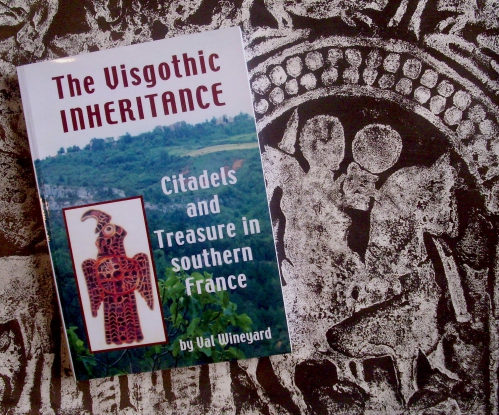The Visigothic Inheritance
"When I felt compelled to research the Visigoths here in Languedoc, I discovered an amazing history, totally at variance with the official history in all the French books - life, death, love, golden treasure, intrigue - it was almost like a dramatic novel!" says author Val Wineyard. She discovered that the Visigoths founded Rennes-le-Chateau; they hid their treasure there and it has never been found.
She found that the Visigoths have been almost ignored, or dismissed as barbarians, by conventional French history and decided to set the record straight.
Extracts from The Visigothic Inheritance.
The founding of Rhedae
It was either 412 or 413 when the Visigoths arrived. They were an advance party of soldiers but they had women and children with them, for they came in covered wagons, wooden with a leather covering. Imagine the setting up of the camp, sending the servants out for wood, the smoke rising in the evening air, the smell of roasting meat, the leather bottles of water or wine being passed from hand to hand, the murmurs of women putting their children to bed in the wagons, the satisfied sighs of the travel-weary people who, fed and contented, settled down to sleep.
The next morning they saw the pink dawn, the long shadows, the wonderful landscape. They heard the sound of the tethered horses snickering to their owners and the Visigoths picked out vital features of the view; the Roman road from Carcassonne to Spain alongside the River Aude and the other road heading east across the Col du Paradis for Narbonne and the Mediterranean coast. This place was perfect!
The Visigoths, having adopted Roman means of travel, would have arrived in carts of Roman design
The Treasure of Jerusalem
We know the treasure came to France with King Ataulf in 414AD and was placed in the treasury of the Visigothic capital, Toulouse. There were two treasures; the Royal Treasure and the Ancient Treasure. The first was the property of the King and the proceeds from taxes; the second was various booty's, which included the Treasure of Jerusalem.
After the defeat of the Visigothic King Alaric II, the French King Clovis moved from Toulouse, which he had taken, to Carcassonne. He knew the Visigothic treasure was there for as he rode towards Carcassonne he told his son all about it and the wonderful time they would have when they shortly became rich. But Carcassonne was so well defended the French could not conquer it.
And the treasure had already been moved to Rhedae and hidden in the crypt of the new château there.
Readers' Comments
I am a bee-keeper and am intrigued by the idea that entire nations - or large groups of them - swarmed out of Sweden on their way to the Midi - no change there then! But I recently heard of a mini ice-age that only ended in the early Victorian era - which might possibly explain the stuffed clothing worn by the Tudors and Stuarts. So perhaps in the early period the colder climate made Sweden's grazing too sparse, and off the Visigoths went. The Beekeeper
Dear Beekeeper
The Visigoths emigrated because they had decided life could be better elsewhere, and they were right.
A Critique
I would have been comfortable as an Arian heretic, that is one who believed in Jesus and God but not that Jesus was divine; I would not then have to confront the tricky questions of Christ's peculiar birth or his resurrection. I prefer to quote the Moslems who say God is God and Jesus was his prophet. Overall, "The Visigothic Inheritance" is an enormous achievement and a tour de force; you have put the Visigoths on the map!
From Martin in Bedfordshire. And Val's reply;
Underlying all my story is an strong criticism of the way religious feelings are used as a legitimate reason to obliterate people we don't like; a reflection of other events in the book, such as Clovis converting to the Roman church so that he could destroy the Visigoths. Here in France we have the Separation of Church and State; people are free to follow their religious consciences as long as they obey the laws of the land. This was exactly the law of the Visigoths. They were some 1,400 years "ahead of their time" yet they are still dismissed as barbarians.
No longer available - sold out!
We are not republishing this book (it was reprinted twice) as a fuller story of the Visigoths is in Val's forthcoming block-buster, Barbarian Gold, devoted to the great treasure for Jerusalem and its hiding place in the region of Rennes-le-Château. Click here.
Inscrivez-vous au blog
Soyez prévenu par email des prochaines mises à jour
Rejoignez les 91 autres membres


